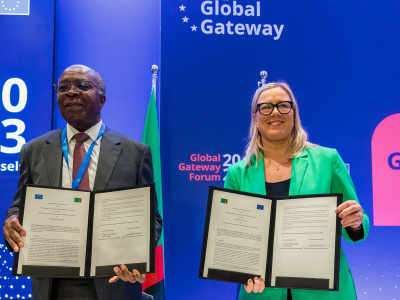
The Lobito Corridor: Between European geopolitics and African agency
Authors
The Lobito Corridor, connecting the DRC, Zambia and Angola, is often discussed in terms of geopolitical competition – with the EU and the US on one side and China on the other – while African agency is largely overlooked. Poorva Karkare and Bruce Byiers explore this geopolitical framing as well as the dynamics within and between the corridor countries, ultimately examining which actors and factors determine the corridor’s success and viability.
This page is also available in French and in Portuguese.
Summary
The Lobito Corridor initiative – connecting the Democratic Republic of the Congo, Zambia and Angola in Southern Africa – is seen from a lens of geopolitical competition between the European Union (EU) and the United States on one side and China on the other, with a particular focus on access to critical raw materials.
This paper examines that framing in terms of the financial viability of the investment and in terms of private sector activities, as well as the dynamics and interactions between and within the corridor countries. This latter aspect has so far been overlooked, leading to insufficient consideration of the agency of the corridor country governments and other actors. Incorporating insights from policy and literature analysis as well as interviews conducted in the three corridor countries, this paper therefore explores the critical question: Which actors and factors determine the success and viability of the Lobito Corridor?
We find that, despite the rhetoric on the EU’s pursuit of critical raw materials through the Lobito Corridor as an alternative to reliance on China, in reality there is limited clarity on actual investments along the corridor. Moreover, strong Chinese presence and firm capabilities – combined with the fact European and Chinese businesses are in practice deeply intertwined – make its involvement difficult to avoid. In addition, the motivations of different African actors, starting with African governments, vary widely. While this is not necessarily problematic, it does raise concerns that the political prioritisation of the steps needed to make the corridor a success will vary between countries.





